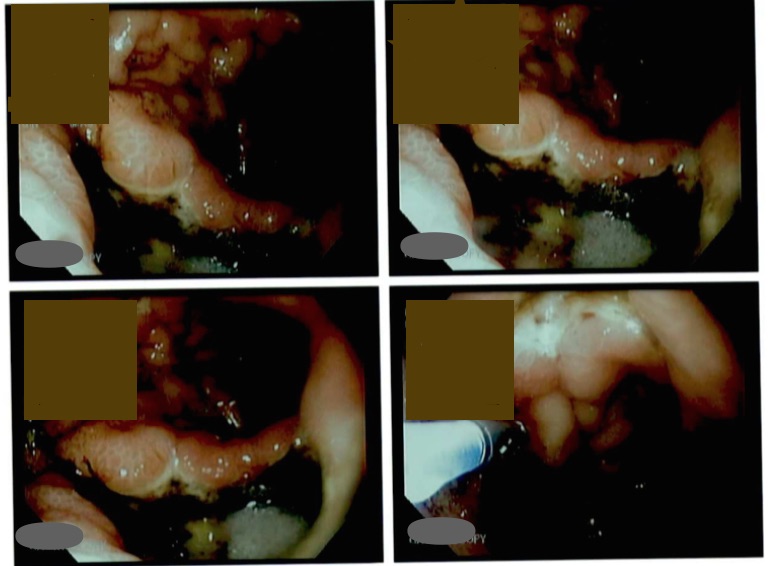Case Presentation: A 66 year old Caucasian female with history of dementia, HTN on amlodipine, HLD on lipitor, spinal stenosis on Meloxicam and GERD on Omeprazole also non alcoholic or non -smoker; was admitted from home after having weight loss for 1 month, recurrent falls, dizziness and black stools for 1 week and acute left hip pain. On admission she had orthostatic hypotension, symptomatic anemia with Hemoglobin (Hb) /Hematocrit (Hct) of 5.6/19.0 (baseline Hb/Hct of 10/28) and negative left hip x-ray. Urgent upper endoscopy (EGD) showed large non-actively bleeding erosive gastric ulcers and esophagitis with raised lesions that were biopsied. Immediate hemodynamic stability was achieved with 3 units packed blood (PRBC), IVF and IV Proton-pump inhibitors (PPI). Final cyto-pathology report showed necrotizing inflammatory exudates with hyphae from Candida species, negative for H. pylori or malignancy. Work up was negative for HIV. She was given 21 days of PO Fluconazole 200 mg daily and PPI 40 mg bid. Meloxicam held and Gastroenterology follow-up set up. Patient missed multiple out-patient appointments and 6 months later her out-patient work up was negative for Gastrinoma/ Lymphoma / Multiple Endocrine Neoplasia.
Discussion: We present a case of bleeding Candida gastric ulcer in a healthy adult with no identified immuno-compromise state/ immunosuppressive treatment/ Alcohol intake or drug abuse. Could the long-term use of Omeprazole be implicated for change in stomach pH allowing Candida infection or did the chronic gastritis predispose to Candida infection, remains unclear? There are small studies suggesting no correlation between the use of H2 receptor blockers or PPI on Candida colonization/ gastric ulcers. Also there is no clear consensus on management of Candida gastric ulcer as well as the role of PPI with antifungal treatment has been debated in few case reports. With the prognosis being poor in untreated patients, role of surgery also has been debated unless in significantly sick patients.
Conclusions: We present one of the rare presentations of Candida causing invasive necrotizing gastric ulcers in apparently healthy stomach. Further research is implied in studying Candidal gastric ulcers and the long-term effect of stomach pH altering medicines in elderly patients and provider caution/ education in use of medicines such as NSAIDS in demented patients.
